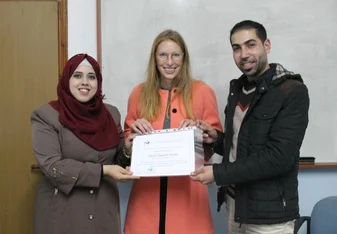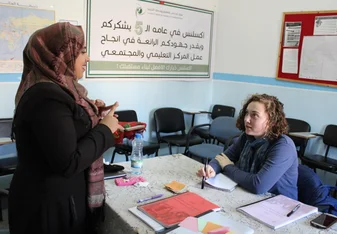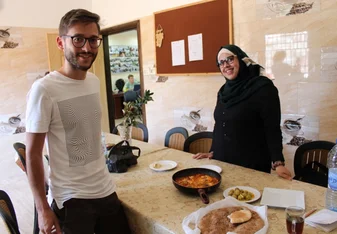Many people who come to the Excellence Center with the goal of studying Arabic are curious about the teachers. Most of us have had a wide spectrum of teachers in our lives, from the friendly kindergarten teacher to the grumpy old Algebra teacher.
We thought it would be a good idea to sit down with one of the Arabic teachers at the Excellence Center and ask her a little bit about herself, in order to give those thinking about studying at the Excellence Center a chance to learn a little bit more about the teachers they will encounter and work with in Hebron. Dua'a has been with the Excellence Center for five years, since 2013.
What’s your daily routine like?
I teach Arabic classes every day. My students are mostly volunteers and students who have come to the Excellence Center from abroad. However, I sometimes teach students who are foreign but live in Hebron. Most of them work for NGOs or TIPH.
How do you like working with foreign students?
I love working with foreign students. I really love teaching and I enjoy meeting new people and discovering new cultures.
What’s it like working with Marwa, Khitam, and the other staff members?
It’s nice, we’re all close friends and will often drink tea or coffee or eat dinner in-between shifts.
What do you like to do when you’re not working?
I spend a lot of time outside the center preparing for upcoming lessons. When I don’t have work to do I like to spend my time praying and reading, nothing in particular, I can read anything! I’m also a bit of a foodie, my favorite foods are makluba and pizza.
What do you wish foreign students knew before coming to Hebron?
Be flexible. Flexibility and the ability to adapt to different cultures and change your schedule on a moment’s notice are key to living in Palestine.
Some foreigners also come to Palestine with some ingrained stereotypes about Arabs and Muslims. Particularly, some people from other cultures have ideas about what women here are like and how they are treated in Islam that isn't reflective of life in Hebron. Be open to changing your opinions as you learn during your time in Hebron.
What do you think are the biggest challenges for foreigners trying to learn Arabic?
Accents tend to be hard for new students of Arabic. Of course, accents are hard to learn in any language. Students also need to learn the practical application of Arabic. Too many students get ahead of themselves by learning big words that they won’t use often while forgetting to learn commonly used words and phrases that they’ll use at the market, school, office, etc.


